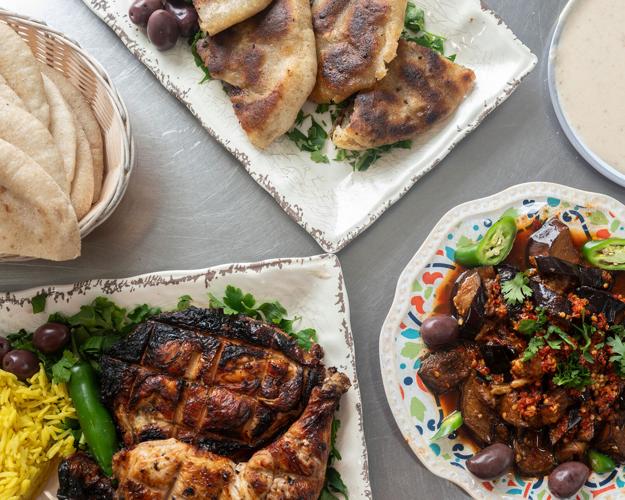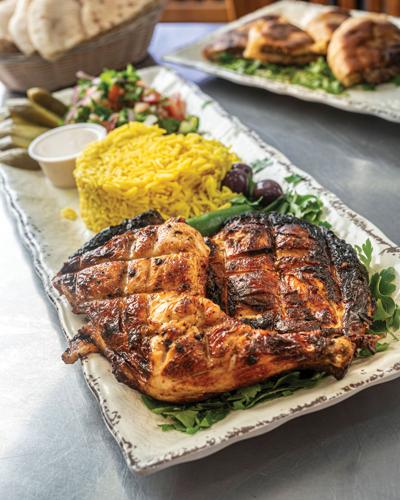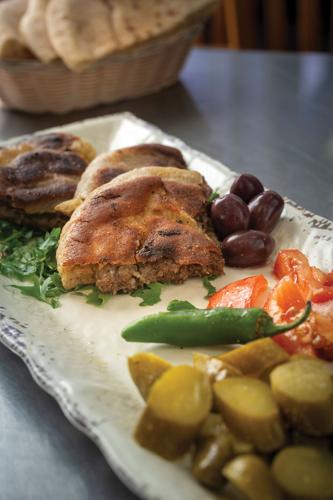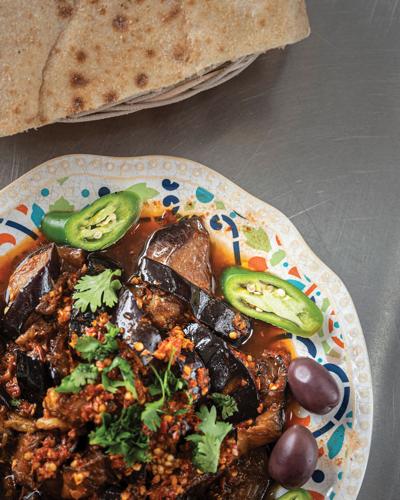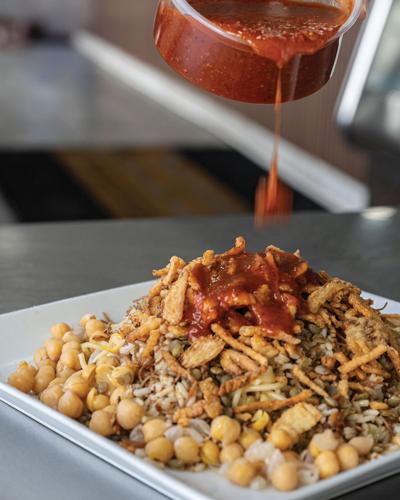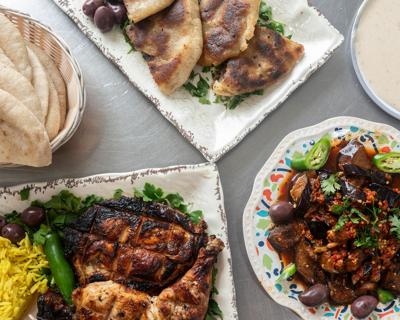Before I go to a restaurant for the first time — food truck or four-star — I do a search of their menu, website and social media platforms. This is true of both personal and professional outings. For the latter, I do a deeper dive, particularly when it’s a cuisine I am not familiar with.
Take, for example, the time I reviewed Osh, Nashville’s first Uzbek restaurant. Where is Uzbekistan, and what is the food? And Edessa, where the fare is Kurdish and Turkish. Before dining at St. Vito Focacceria, I looked up sfincione, the specialty at chef-owner Michael Hanna’s Sicilian place in the Gulch.
I don’t remember how Galilee first caught my eye — their social media presence is minimal, and I’ve not seen any press. But however it arrived in the restaurants file I keep in the Scene folder on my computer, it piqued my curiosity, and in late April, four of us set out to discover “Where the Nile Meets Nashville,” as its website touts. That happy convergence takes place at 2713 Murfreesboro Pike, “A Culinary Oasis in Antioch, TN!”
So, Egypt. What is the food? Not a clue. Even friends who traveled to Egypt were hard-pressed to describe it. According to Travel Food Atlas, “Egyptian food combines vegetables, beans, legume, lentils, onions, pasta, rice and cumin with Mediterranean influences.”

Koshary
Multiple sources name koshary (also koshari) as Egypt’s national dish — a carb-lover’s nirvana with rice, pasta, vermicelli, chickpeas, lentils, onions and spices.
Kofta (a spiced mix of ground beef and lamb cooked on skewers) is a staple, as are falafel and kabobs; chicken, lamb and liver are recurring proteins; eggplant and okra turn up in multiple dishes or flying solo, as do fava beans, including in a sandwich. Speaking of sandwiches, aish baladiis theEgyptian pita — a sourdough whole-wheat flatbread that bakes up puffy. Traditionally served at every meal, it can also be made with refined flour, but whole wheat adds the substance that white misses.
The aish baladi is foundational to a very popular Egyptian street food specialty — the hawawshi, a pita stuffed with seasoned ground meat.
Loaded with that info, and locked into the address, we headed to Antioch’s culinary oasis — and drove past it multiple times, despite The Voice of Siri announcing our arrival at a parking lot that did not appear to be home to anything but Good Shepherd Pharmacy and Joseph Cake. That’s the place.
The entrance to Galilee — marked by the large, blue-lit letters “GYROS” — is slotted between Sam Bakery and Joseph Cake. It shares space (though not a kitchen) with Joseph Cake; one case holds decorated layer cakes and another sheet pans filled with Egyptian/Middle Eastern desserts that may come from Sam. With no one at Joseph’s counter, we could only window-shop.
The bare tables and mismatched chairs are for Galilee’s customers; what the small space lacks in ambiance is overridden by enticing scents wafting from the kitchen and tantalizing food photos on the colorful overhead menu boards.

Hawawshi
Those photos — and the accompanying numbers on each dish — are key to ordering, which one does at the counter. We were the only English speakers on site all night, and none of us speak Egyptian Arabic, so I pointed at photos and used the numbers. At the counter man’s request, I directed my questions to his phone, which had a language-translation app; he read the written translation and replied into his phone, which translated to English for me to read. Genius.
We wanted the specialties and the staples, so I ordered hummus, baba ganoush, bread (50 cents per plump pita!), koshary, hawawshi, lamb kabob, kofta meal, the half grilled chicken meal, eggplant and okra casserole — the last of which they were unfortunately out of. Or fortunately, considering the quantity of food that arrived in no particular order at our table; or tables, since we had to pull over another four-top just to hold all the dishes.
We each received a small plastic plate and plastic cutlery for personal use, and then we dug right in, piling our plates with some of everything, pulling quarters of warm bread from the basket.

Half grilled chicken meal
Each meal comes with yellow rice, a salad of lightly dressed chunks of cucumber and tomato, sliced red onion and fresh herbs, bread, tahini, pickles, pickled vegetables and, on request, a whole pickled jalapeño. I can’t recall which dish came with the thimble of what we were warned was “very hot,” but the ensuing fire from a little dab had me chugging desperately from the water bottle.
The bread is truly exceptional, with a soft interior and yeasty flavor thanks to the sourdough, a substantial scoop for the baba ganoush and hummus.
The kofta had a bad night — underflavored, overcooked and so dry that not even swathing it in tahini sauce helped. The lamb and the chicken — a leg quarter and breast — on the other hand, were grilled just right, tender, moist and sporting a nice char.
Hawawshi makes a smashing debut in my unofficial catalog of Spectacular Sandwiches of the World. Cumin, coriander, allspice, diced onion, garlic and green pepper season the ground meat, which in cooking seeps fat into the bread, finished for a crisp by a flip on the flattop.
Koshary is centuries-old comfort in a bowl — also known as poor-man’s food for its humble pantry staples. At Galilee, in addition to the lentils, rice and chickpeas, the pasta was spaghetti and ditalini, with something crunchy — possibly fried onions. It is served with a ramekin of tomato sauce and one of vinegar, which — as it was demonstrated to us — should be stirred into what reminded me of my mother’s endless repertoire of budget-stretching casseroles. Minus the cream-of-something soup.

Eggplant
Mixed reviews from our quartet of discerning diners — one (bite) and done for me, “more please” from the carb-lover, meh from the other two.
It was the eggplant we couldn’t get enough of — literally — and were all still raving about days later. Chunks of the meaty vegetable, skin on, with olive oil and salt, chargrilled right in front of the entrance, is simplicity at its most sublime. Do not pass it by.
Nashville’s explosive wealth growth is inescapable. For my money — which in this case was a grand total of $97.05 — finding connection through modern technology to translate ancient foodways of Egypt and sit at a table in a culinary oasis in Antioch is priceless.

